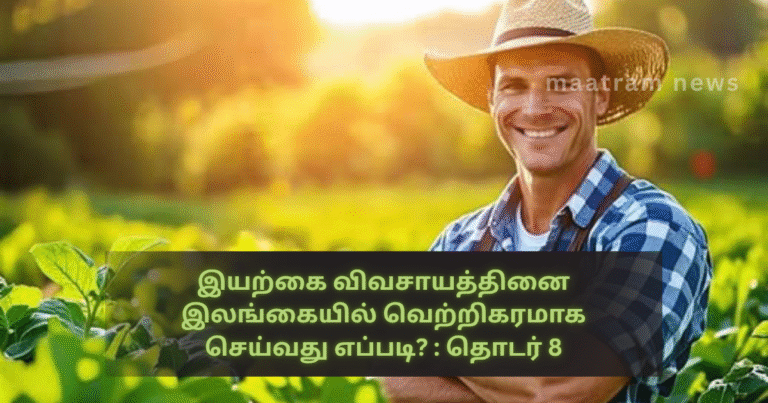நாம் 2013 முதல் 2014 வரை How to Successfully Practice Natural Farming in Sri Lanka? : Series 8 165 விவசாயிகளுக்கு கிழக்கு பல்கலைக்கழகத்தின் முன்னாள் விவசாய பீடாதிபதி பேராசிரியர் வை. அருள்நந்தி மற்றும் ஓய்வு பெற்ற கமநல சேவை அதிகாரி திரு எஸ். பத்மநாதன் ஆகியோரின் ஊடாக மட்டக்களப்பு மாவட்டத்தில் மண்டூர் முதல் வெருகல் வரை இலவசமாக, முற்றிலும் எமது சொந்த செலவில், இயற்கை விவசாய பயிற்சி வகுப்புகள் மற்றும் கருத்தரங்குகள் நடத்தியுள்ளோம்.
மட்டக்களப்பு கரடியானாறு கமநல சேவை நிலையம் திறக்கப்பட்ட பின்பு நடந்திருந்த முதல் நிகழ்வாக எமது முதல் இயற்கை விவசாய பயிற்சி வகுப்பு 2013 ஆகஸ்ட் 30 அன்று மருதம் இயற்கை விவசாய அமைப்பின் 64 விவசாயிகளுடன் இடம்பெற்றது. (அன்று நடப்பட்ட முந்திரி மரம் இந்நிகழ்வின் சாட்சியாக அங்குள்ள முன்றலில் நன்கு வளர்ந்து காய்த்து நிற்கிறது.)
சுபாஷ் பாலேக்கர் அவர்களின் முறையில் இயற்கை உரம் தயாரிப்பு, ஜீவாமிர்தம், பஞ்சகாவ்யம், வேம்பு அஸ்திரம், மூவிலை கரைசல், ஐந்திலை கரைசல், 3G கரைசல் போன்ற இயற்கை கரைசல் தயாரிப்பு அறிவினைப் பெற்ற மொத்தம் 165 பேரில் 147 பேர் இரண்டு ஆண்டுகளுக்குள் மீண்டும் இரசாயன விவசாயத்துக்கு மாறிவிட்டனர். இதற்கு நோய்த்தாக்கமே முக்கிய காரணமாக பலரால் கூறப்பட்டது.
ஆயினும், குடும்ப பொருளாதார அழுத்தங்கள், கொம்போஸ்ட் மற்றும் கரைசல்கள் தயாரிப்பதற்கான நேரமின்மை அல்லது ஊக்கமின்மை, அருகிலுள்ள வழக்கமான விவசாயம் செய்வோரின் ஊக்கம் இழக்க வைக்கும் ஆலோசனைகள், விளைபொருட்களின் அழகற்ற தோற்றத்தால் பொது சந்தையில் கிடைக்கும் சாதாரண விலை, குறைந்த விளைச்சல் போன்ற பல காரணங்களும் சேர்ந்திருந்தன.
ஆயினும் இயற்கை விவசாயத்தை தொடர்ந்து முன்னெடுத்த அந்த 18 பேரில் 12 பேர் பெண்கள் என்பது பெருமையாக குறிப்பிடத்தக்கது. (இவர்கள் எமக்கு முன்பும் சில அரச சார்புள்ள நிறுவனங்களால் இயற்கை விவசாயப் பயிற்சி பெற்றவர்கள்.)
எமது அவதானிப்பின் படி, நாம் பயிற்சி வழங்கிய பெரும்பாலானோர் Gen X தலைமுறையினர் (1965 – 1979) மற்றும் அதற்கு முன்பட்ட Gen B தலைமுறையினர். இவர்களில் சுமார் 90% பேர் புதிய முயற்சிகளை மேற்கொள்வதை விட தமக்குச் சொந்தமான வசதியான சூழலில் (comfort zone) தமக்குத் தெரிந்த விவசாயத்தையே செய்வதை விரும்பினர்.
ஆயினும், சுமார் 10% பேர் திறந்த மனதுடன் விடாமுயற்சியுடன் இயற்கை விவசாயம் மேற்கொள்வதில் ஆர்வமுள்ளவர்களாக இருந்தனர். குடும்ப பொருளாதார அழுத்தங்களை தாண்டியும் தொடர்ந்து இயற்கை விவசாயம் மேற்கொள்பவர்கள் பாராட்டத்தக்கவர்கள்.
இப்போது விவசாயத்துக்கு வரும் Gen Y (1980 – 1997) தலைமுறையினரில் சுமார் 60% பேரும், Gen Z (1997க்குப் பிந்தைய) தலைமுறையினரில் சுமார் 85% பேரும் புதிய முயற்சிகளிலும் இயற்கை விவசாயத்திலும் தீவிர ஆர்வமுடையவர்கள் மற்றும் தொழில்நுட்ப அறிவு கொண்டவர்கள்.
இவர்களை இயற்கை விவசாயம் பற்றிய பெருவணிக உலகின் பொய் பரப்புரைகள் Gen X இனரைப் போல ஏமாற்ற முடியாது. இவர்கள் நம்மாழ்வார் ஐயா காட்டிய வழியில் இயற்கை விவசாயத்தினை புத்திசாலித்தனமாகவும் நேர்மையாகவும் மீட்டெடுப்பார்கள் என்பதில் எமக்கு 200% நம்பிக்கை உள்ளது.
இதனை மெய்ப்படுத்த Gen Y மற்றும் Gen Z இனர் கடின உழைப்பை விட புத்திசாலித்தனமான (smart work) மற்றும் நேர்மையான திட்டமிடலுடன் செயல்பட வேண்டும்.
நீங்கள் ஓர் வெற்றிகரமாக இயங்கும் தனியார் நிறுவனத்தை கவனித்தால், அங்கு திட்டமிடல் (இடர் முகாமைத்துவம் உட்பட), நிதி நிர்வாகம், விளம்பரம், சந்தைப்படுத்தல், விற்பனை மற்றும் வாடிக்கையாளர் முகாமைத்துவம் ஆகியவை சிறப்பாக நிர்வகிக்கப்படுவதை காணலாம்.
அதேபோல், இயற்கையை விரும்பும் Gen B, Gen X, Gen Y மற்றும் Gen Z தலைமுறையினர், உங்கள் இயற்கை விவசாயத் தோட்டம் சிறியதாக இருந்தாலும் அதனை ஓர் தனிநபர் நிறுவனம் போல சிறந்த திட்டமிடலுடன் நிர்வகியுங்கள்.
ஒரு நிறுவனத்தில் திட்டமிடப்படும் இடர் முகாமைத்துவம் போலவே, உங்கள் தோட்டத்தில் நோய்த்தாக்கங்கள் மற்றும் காலநிலைகளுக்கு ஏற்ப விவசாயத்தை திட்டமிட வேண்டும்.
நோய்த்தாக்கங்களுக்கு நாம் திட்டமிடும் போது, “இயற்கை விவசாயம் என்பது வருமுன் காப்போம்” என்ற அடிப்படை விதியில் தங்கியுள்ளது என்பதை மனதில் வைத்திருக்க வேண்டும்.
இதற்கு ஒரு அளவுக்கு ஆர்வமும் அறிவுத் தேடலும் அவசியம். இவை அனுபவம் வாய்ந்த விவசாயிகளிடமிருந்தும், விவசாய ஆராய்ச்சியாளர்களிடமிருந்தும், விவசாயம் சார்ந்த அரசு/தனியார் அதிகாரிகளிடமிருந்தும், இயற்கையை கவனமாக அவதானிப்பதன் மூலமும், காலநிலை முன்னறிவிப்புகளின் மூலமும், இணையம், சமூக வலைத்தளங்கள் மற்றும் செயற்கை நுண்ணறிவு போன்றவற்றிலிருந்து பெறப்படும் அறிவினை ஒருங்கிணைத்தலின் மூலமும் வெற்றிகரமாக திட்டமிடலாம்.
உதாரணமாக, கத்தரிக்காய் பயிர் நடுவதற்கு திட்டமிடும் போது — எந்த மாதத்தில் நடுகிறோம், என்ன காலநிலை, நாற்று மேடை முதல் அறுவடைய்வரை நீர் முகாமைத்துவம் (சொட்டு நீரா, தூவலா, குழாய் மூலம் விசிறலா, பாத்தி கட்டல் மூலமா), எந்த நேரத்தில் நீர் பாய்ச்ச வேண்டும், எந்தந்த பயிர் பருவங்களில் எந்த கரைசல்கள் எப்படிக் கொடுக்க வேண்டும், கொடுக்கும் பசளை தொற்று நீக்கப்பட்டதா (வாடல், வேர்புழு), காய் துளைப்பான், தண்டு துளைப்பான், புழுத் தாக்கம் தவிர வேறு எந்த பூச்சிகள் வரும் (சாறு உறிஞ்சும் பூச்சி, போலிப் பொறிவண்டு), எந்த மாதத்தில் எந்த பீடையின் இனப்பெருக்க காலம், பூச்சிகள் செயற்படும் நேரம் போன்றவற்றை திட்டமிட்டு, அவற்றுக்குரிய முன்னேற்பாடுகளை செய்து வைக்கும்போது பல ஆபத்துகளை தவிர்க்க முடியும்.
தற்போது நோய்களை இனங்காண, உங்கள் தொலைபேசியில் நோய்த்தொற்றுப்பட்ட தாவரப் பகுதியை தெளிவாகப் புகைப்படம் எடுத்து AI மூலம் வினவினாலும் அல்லது Plantix போன்ற செயலிகளில் பதிவேற்றினாலும் தீர்வுகள் உடனடியாகவோ சில மணித்தியாலங்களுக்குள் கிடைக்கின்றன.
மேலும், தமிழ்நாட்டில் உள்ள திரு. பிரிட்டோராஜ் போன்ற பல இயற்கை விவசாய நிபுணர்கள் இலவசமாக டெலிகிராம், வாட்ஸ்அப் குழுக்களில் ஒரு நாளுக்குள் தீர்வு ஆலோசனைகள் வழங்குகின்றனர். எனவே நாம் முன்பைப் போல தீர்வுகளுக்காக அலைந்து திரிய வேண்டியதில்லை. இப்போது எல்லா தீர்வுகளும் நம் கையில் உள்ள மொபைல் மூலம் கிடைக்கும் காலம் இது.
(தொடரும்)
CSJ Agri
31/10/2025
இயற்கை விவசாயத்தினை இலங்கையில் வெற்றிகரமாக செய்வது எப்படி? : தொடர் 7
https://maatramnews.com/articles/how-to-successfully-practice-natural-farming-in-sri-lanka-series-7/
மேலதிக தகவல்களுக்கு மாற்றம் செய்திகள் இணையத்தளத்தினுள் பிரவேசியுங்கள்.
மேலதிக தகவல்களை உடனுக்குடன் பெற்றுக்கொள்ள மாற்றம் செய்திகள் முகநூல் பக்கத்தை பின்தொடரவும்.
How to Successfully Practice Natural Farming in Sri Lanka? : Series 8
From 2013 to 2014, we conducted free natural farming training programs and seminars for 165 farmers in the Batticaloa District, from Mandur to Verugal, through former Dean of the Faculty of Agriculture, Eastern University, Professor V. Arulnandy, and retired Rural Development Officer Mr. S. Pathmanathan, entirely at our own expense.
After the opening of the Batticaloa Karadiyanaru Rural Service Center, our first natural farming training program was held on 30 August 2013, with 64 farmers from the Marutham Natural Farming Organization. (The cashew tree planted that day still stands in the courtyard as a witness to the event, growing well and bearing fruit.)
Out of the 165 individuals trained in Subash Palekar’s method of natural fertilizer preparation — Jeevamrutham, Panchagavya, Neem Extract, Moolilai Solution, Aindhilai Solution, and 3G Solution — 147 returned to chemical farming within two years. Many stated that disease attacks were the main reason. However, other contributing factors included family financial pressures, lack of time or motivation to prepare compost and solutions, discouragement from nearby conventional farmers, low market prices due to unattractive produce appearance, and reduced yields.
However, among the 18 who continued natural farming, 12 were women, which we proudly acknowledge here. (Most of them had previously received natural farming training from certain government-affiliated institutions.)
From our observation:
Most of the people we trained belonged to Generation X (born 1965–1979) or earlier (Baby Boomers – Gen B). About 90% of them preferred to stay within their comfort zones, doing the type of farming they were already familiar with, rather than attempting new approaches. Yet around 10% were open-minded, determined individuals who showed genuine interest in pursuing natural farming despite economic pressures — these people truly deserve appreciation and recognition.
In contrast, among those entering farming now, nearly 60% of Gen Y (1980–1997) and about 85% of Gen Z (born after 1997) show strong enthusiasm for innovation and natural farming, along with technical knowledge.
These younger generations cannot easily be deceived by the false propaganda of the commercial agricultural world, as happened with many Gen X farmers. We have 200% confidence that they will revive natural farming smartly and ethically, following the path shown by Nammalvar Ayya.
To make this a reality, Gen Y and Gen Z must work not only hard (hard work) but also smart, with honest and strategic planning.
Observe any successful private enterprise — there you’ll find effective planning (including risk management), financial control, marketing, promotion, sales, and customer management.
Similarly, whether large or small, treat your natural farm like a one-man company — manage it with proper planning. Just like risk management in a company, you should plan your farming practices according to disease attacks and weather conditions.
When planning for disease prevention, remember that natural farming is based on the principle of prevention rather than cure.
This requires curiosity and a thirst for knowledge — gained through experienced farmers, agricultural researchers, government and private officers, careful observation of nature, weather forecasts, and by effectively integrating knowledge from the internet, social media, and artificial intelligence.
For example, when planning to cultivate eggplant (brinjal), one must consider —
which month to plant,
what the weather conditions will be,
water management (drip, sprinkler, hose, or pot system) from nursery stage to harvest,
what time irrigation should occur,
which natural solutions to apply and when,
whether the compost used is pest-free (wilt, root grubs),
and what pest threats to expect (fruit borer, stem borer, sap-sucking insects, false ladybird beetles, etc.).
Knowing the breeding seasons and active hours of pests allows you to prepare in advance and minimize losses.
Nowadays, you can easily identify plant diseases by taking clear photos with your mobile phone and querying AI tools or uploading them to apps like Plantix — solutions are often available immediately or within a few hours. Moreover, many natural farming experts, such as Mr. Brittoraj from Tamil Nadu, offer free advice within a day through Telegram and WhatsApp groups. Hence, unlike before, we no longer need to wander in search of solutions — everything we need is literally at our fingertips.
(To be continued)
CSJ Agri
31/10/2025



